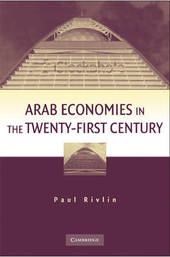
|
Arab Economies in the Twenty-First Century
Paperback / softback
Main Details
| Title |
Arab Economies in the Twenty-First Century
|
| Authors and Contributors |
By (author) Paul Rivlin
|
| Physical Properties |
| Format:Paperback / softback | | Pages:328 | | Dimensions(mm): Height 228,Width 153 |
|
| Category/Genre | Economics |
|---|
| ISBN/Barcode |
9780521719230
|
| Classifications | Dewey:330.0956 |
|---|
| Audience | | Postgraduate, Research & Scholarly | |
|---|
| Illustrations |
62 Tables, unspecified; 32 Line drawings, unspecified
|
|
Publishing Details |
| Publisher |
Cambridge University Press
|
| Imprint |
Cambridge University Press
|
| Publication Date |
16 February 2009 |
| Publication Country |
United Kingdom
|
Description
This book examines the relationship between demographic growth and economic development in eight Arab countries. Despite a slowdown in demographic growth, as a result of the change in the age structure of the population, the labour force is increasing rapidly. In other parts of the world, similar developments have enhanced economic growth. In the Arab world, however, many of the opportunities presented by demographic transition are being lost, resulting in serious threats to the political stability of the region. The main reason for this is that the region has missed out on industrialization. The book goes beyond conventional analysis to ask two closely related questions. The first is, why were governments so slow in tackling stability? The second is, why has the response been similar in apparently different economies? Answers are provided using new literature in economics and economic history.
Author Biography
Paul Rivlin is the author of three books: The Dynamics of Economic Policy Making in Egypt (1985), The Israeli Economy (1992) and Economic Policy and Performance in the Arab World (2001), as well as numerous monographs, papers, contributions to books, and reports on economic development in the Middle East and on international energy markets, defence, and trade economics. Educated at Cambridge, Harvard and London universities, he taught undergraduate and graduate courses on Middle East Economics at Tel Aviv and Ben Gurion universities and has been a Visiting Professor of Economics at Emory University. He has lectured in the United States, China, India, Japan and Europe.
Reviews'Rivlin's analysis of the Arab economies is the most thorough and astute available today, offering exceptional insights into the interactions of history, politics, and economics across the region. Rivlin focuses our attention on how the Arab world has squandered the 'demographic gift' of a rapidly growing work force and shrinking portion of dependents. He shows how political conservatism has not only been supported by oil revenues and remittances, it has blocked the reforms needed to promote modern education and rapid industrialization. As a result, rapid labor force growth has not been a source of rising productivity, but of rising unemployment, political restiveness, and radicalism.' Jack A. Goldstone, George Mason University 'Rivlin's book is a must-read for anyone seeking to understand the causes and consequences of the poor economic performance of the Arab economies. It presents a coherent and comprehensive analysis of the economic, social, and political factors that hinder economic development and prevent political changes in this important part of the world.' Avner Greif, Stanford University 'Once home to major commercial centers, the Arab world is now a minor player in the world economy. In this nicely crafted book, Paul Rivlin lays out the relevant facts and figures with close attention to variations across countries. He also offers a bold interpretation that centers on institutions, demographic trends, and constraints rooted in religion. The research is imaginative and the synthesis both original and provocative.' Timur Kuran, Duke University 'Rivlin skillfully addresses in comparative context the vital issue of how Arab political economies are dealing with their 'youth bulge.' His investigation of their failure adequately to capitalize on this potential human resource asset sheds valuable new light on both this specific topic and the more general one of Arab economic development.' Robert Springborg, Naval Postgraduate School, Monterey
|